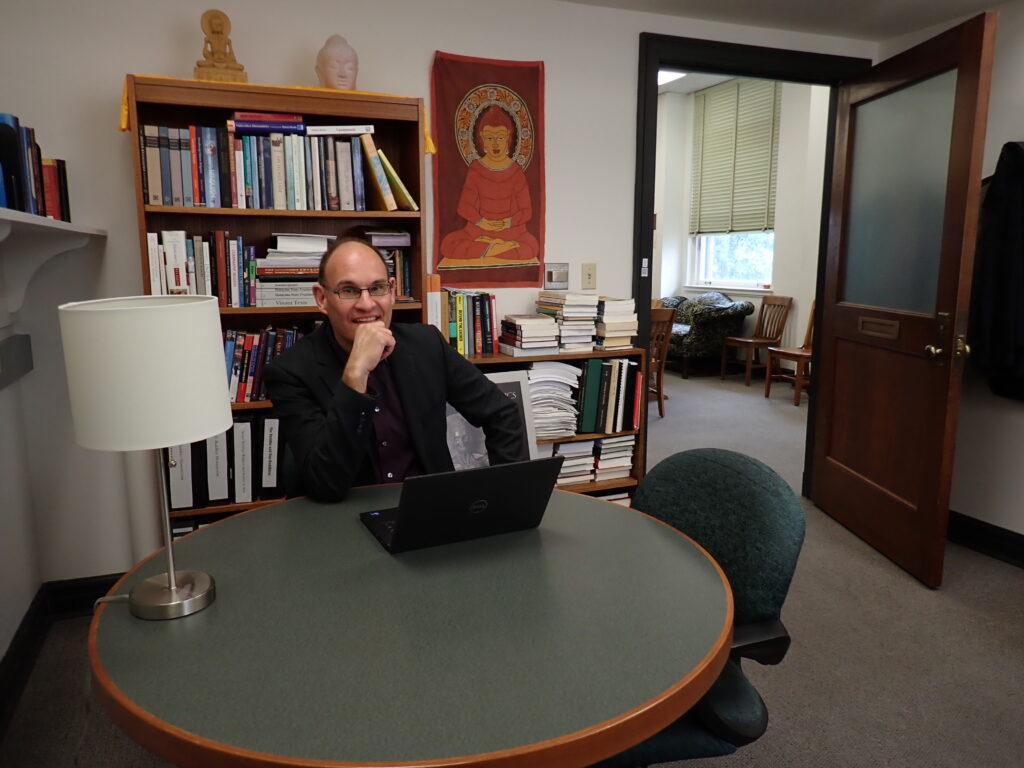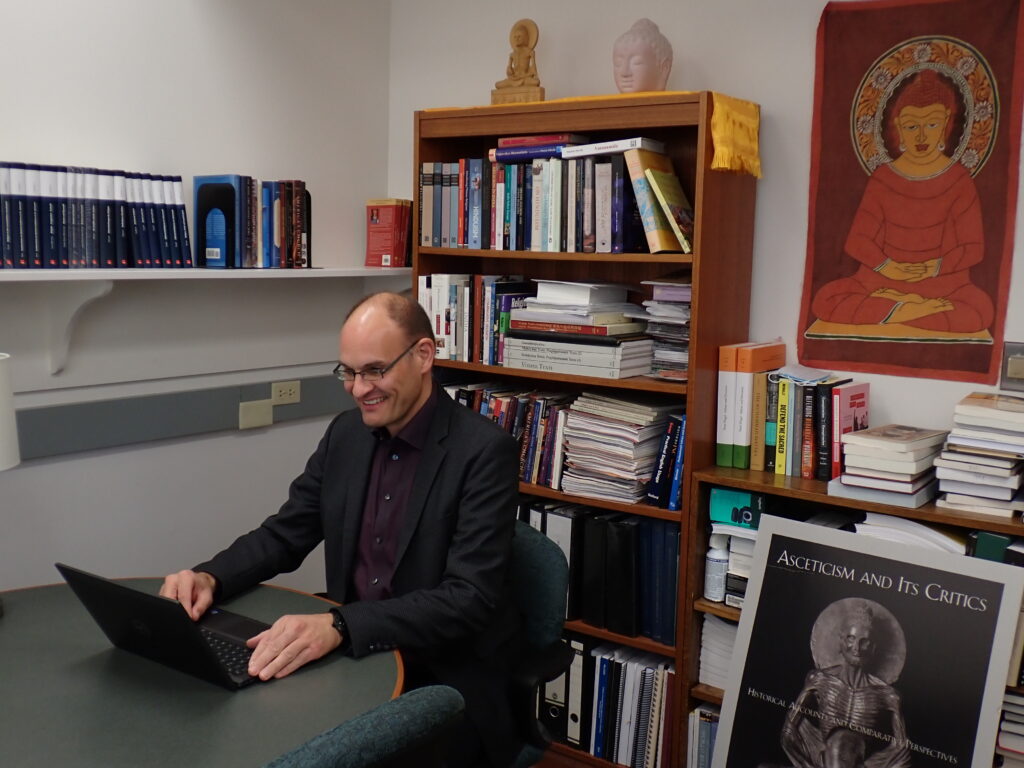by Harsha Gautam

Introduction: Oliver Freiberger is a Professor of Religious Studies and Asian Studies and a Faculty Affiliate of the South Asia Institute at The University of Texas at Austin. He completed his Ph.D. in Indology, with minors in History of Religions and Tibetology, at the University of Göttingen in 1999 and received his Habilitation degree in Religious Studies from the University of Bayreuth in 2009. He was a Donald D. Harrington Faculty Fellow at UT in 2002-03 and joined the faculty in 2004. Prof. Freiberger’s primary research interests include the history of Buddhism in South Asia, asceticism, religious boundary-making, and comparison in the study of religion. His most recent books, on the comparative method in the study of religion, are Considering Comparison: A Method for Religious Studies (Oxford University Press, 2019), and Religionsvergleich: Ansätze, Kritik, Praxis (Nomos, 2022), a German-language textbook on comparison.
HG: Why did you become interested in the study of Religion?
Prof. Freiberger: Tough question! Well, I have always been interested in Religion, even when I was in high school. I grew up in a Protestant Christian environment and we had a lot of discussions with the pastor and among ourselves. We had a pastor who was very progressive and we would get together and read all kinds of non-Christian religious texts as well. It made me interested in Religion and when I went to the university, I said that I wanted to do Religion! At the University of Göttingen, Germany, we had to do two minors and one had to be in a field that teaches you languages and there was a very long of list of subjects to choose from. I ended up with Indology just because it seemed interesting but I did not know anything about it. I started studying Sanskrit and at that time in Göttingen, there was a big focus on Buddhism. Eventually, I also got interested in that and it came together that way. But I have always been interested in the study of Religion. Buddhism and India was one example of studying Religion and I ended up studying Indology and my dissertation was on a Religious Studies question, I would claim.
HG: What was that Question?
Prof. Freiberger: Let me phrase it, the question was: What is the role of the ‘saṅgha’ in the ‘dharma’? Further what role does the monastic community play in the teachings of the Buddha? And if it is necessary to be in the monastic community to attain awakening? I chose to study the Sutta Piṭaka instead of the Vinaya, which was a popular choice. I wanted to explore the question of what does the sangha really mean? And I found that there are different opinions in the texts. There were primarily two tendencies: one that was institutional and one that was more individual. The questions were answered differently in the texts. I found that lay people have also attained nirvana but then there are passages that say, that it is not possible and lay people are always under the monastics. That the lay people support the monastics. I looked at this relationship through laity and also through other ascetic groups.
HG: What influenced your theoretical approach in Grad School?
Prof. Freiberger: We did not really have a Grad School. We began with a long MA and not with a BA and then we did our exams at the end of the MA and then we start the dissertation. So there was a long period where you transition from undergrad to Grad but no real break. And because I was doing Indology for my MA dissertation, we were doing the historical and philological method and that’s it and that was all that was expected of us. Nobody asked for any other theory or method.
HG: How did your theoretical interests change over time?
Prof. Freiberger: It grew over time, I would say. The historical-philological method only took me so far. But it did not give me the questions for my research. I got the questions from people who studied Religion in a theoretical way. It was looking at Religion in this way that informed my thinking, questioning and research.

HG: How do you define and look at Religious Studies as a discipline?
Prof. Freiberger: I love to talk about that question! There are a lot of approaches of people who have studied how to define a ‘discipline’. Some say discipline is supposed to have a common subject-matter and a common method and Religious Studies (henceforth, RS) does not have either and other fields also study religion. But this is not how you define a religion. There are many other criteria, which are much more meaningful as there are other disciplines with the same problem. The same methods are shared by so many disciplines- historical/philological, ethnography, etc. What is much more important is that you must have a common discourse that revolves around the same theme and that is ‘Religion’ for RS and it can be easily identified when we see who is interested in defining Religion and it is the people in Religious Studies. RS constantly talks about what Religion is and what to do about it. Sociology talks about Religion but it does not define it, it talks about society. Similarly, Anthropology is about Culture. People interested in this theme of Religion can be called RS people.
Next, we can think about the institutions come around this theme. But these institutions are not the departments but the programmes. The undergrad/graduate programmes are what that define these institutions. People who do not identify with RS can also contribute to the education of these programmes. Further, students are expected to get familiar with a certain canon of works. This canon is not fixed but some works are absolutely essential such as J.Z. Smith for Religion and for Sociology, it is Durkheim, Weber, etc. There is always an idea of an ideal that you should do.
Finally, there are gatekeepers that define that discipline, like the editors of journals and peer-reviewers. Boundaries are constantly shifting and getting drawn and re-drawn but then they exist and are real. There are academic associations, grant awarding association, etc. that function through the quality control of peer-review system which is not arbitrary. These people and institutions are defining these boundaries. That’s the major difference between a discipline and a field which does not have these kinds of boundaries. When you talk about inter-disciplinarity, you are saying there are two disciplines, reinforcing that there are two disciplines, i.e. boundaries. Multi-theoretical and Multi-methodical approaches are common to all disciplines and that is not inter-disciplinarity in terms of RS, because you are not changing disciplines. You are just using theories of other discipline for your own research.
HG: Can you elaborate about the Comparative Approach to the study of Religion that you talk about in your recent book?
Prof. Freiberger: RS is based on comparison. Religion is the central category of RS and Religion as a category is inherently comparative- it applies to many different things, like literature. Therefore, everything we do is based on the idea that there are different species out there, if you will, that can be grouped under the genus of religion. For example, the ‘initiation ritual’ is a comparative term. Because there is no one particular ritual that can be called as the ‘initiation ritual’. There are several categories that can all be called as initiation ritual. In my book I make the distinction between the meta-language and the object-language. For instance, the Hindu tradition of ‘upanayana’ would be object language and ‘initiation ritual’ would be the meta-language. There are many cases of initiation rituals but you can productively use these categories only when you compare and realise that comparison is at the base of it all. To progress in scholarship, we have to do comparison all the time. I claim that all of us do it all the time anyway, but might not always be aware of it. It is one of the methods for RS if not the only method. And it is mostly under the surface. It is not cross-cultural comparison which people usually think comparison in RS is, like comparing the Veda and the Torah. One does not have to go that far. My argument is that small-scale comparisons are a continuum to cross-cultural comparisons and the former gradually leads to it. When you acknowledge that you are comparing things then you can try moving further away and further away and maybe even to cross-cultural comparisons. But to do that, certain things are to be taken into account and be aware of as you can make mistakes and end up with things that are rightly criticized. Nonetheless, comparison is at the heart of RS as the whole vocabulary is made out of a comparative perspective.

About the Interviewer:
Harsha Gautam is a Ph.D. student in the Religions in History track in the Department of Religious Studies at UT Austin. She specializes in the study of premodern South Asia, early Buddhism, Sanskrit and Pāli literature and South Asian Art. Her research interests also include religious identity formation, power relations, comparison and intellectual history.
